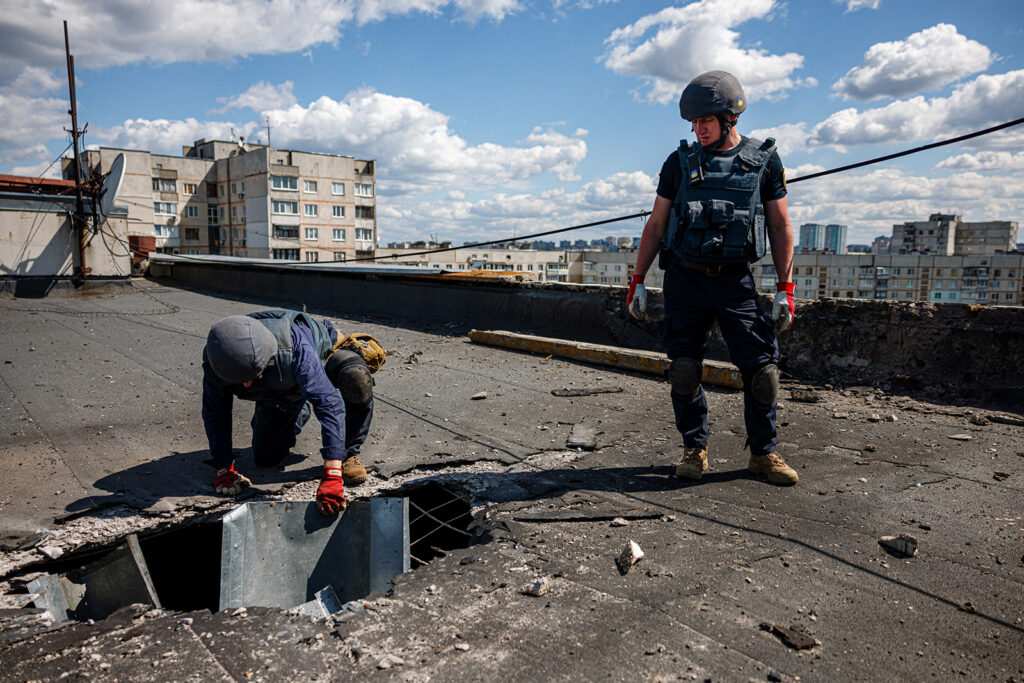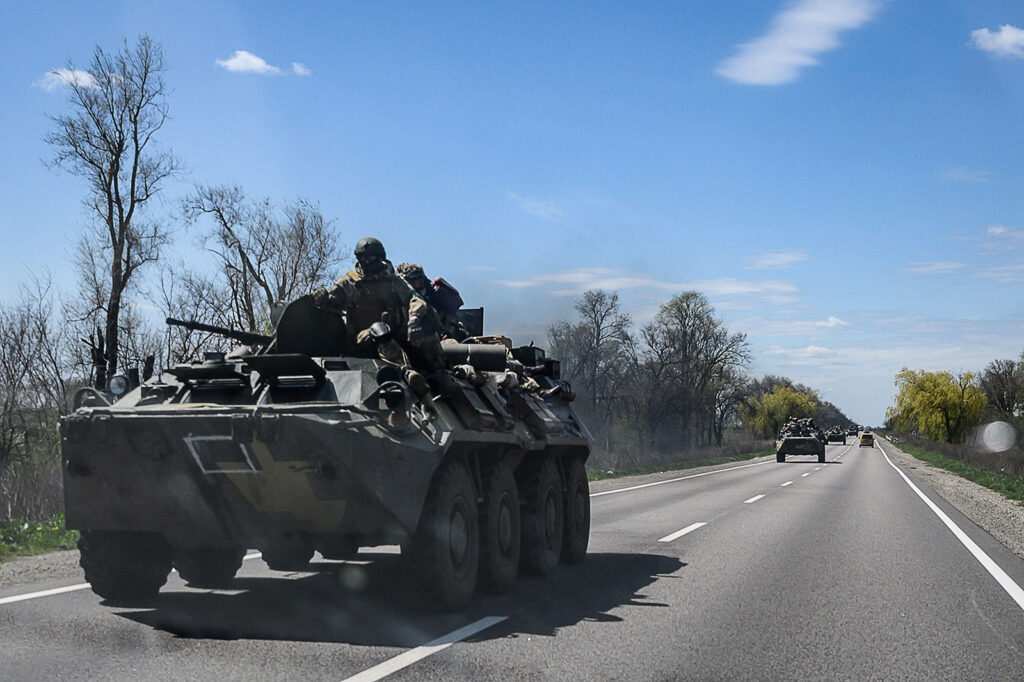Ending days of relative calm in the Ukrainian capital, Russia on Thursday bombarded Kyiv — as the head of the United Nations visited and met with President Volodymyr Zelenskyy — while also ramping up attacks along the besieged country’s eastern front, Ukrainian officials said.
The attacks came as President Joe Biden announced he was seeking $33 billion in additional military and humanitarian aid for Ukraine and also sought congressional approval to seize the assets of Russian oligarchs who support Russian President Vladimir Putin and use the funds to help Ukraine.
“The cost of this fight is not cheap, but caving to aggression is more costly,” Biden said in announcing the new package to be spent over the next five months.

Thursday’s missile attacks on Kyiv hit an apartment building, injuring several people — many trapped in rubble — and killing at least one, city officials said. The explosions came as U.N. Secretary-General António Guterres was winding up a day of meetings in the capital with Zelenskyy and others to discuss the evacuation of civilians from the nearly obliterated southern port city of Mariupol, among other issues.
The new attacks “prove that we must not drop our vigilance,” Zelenskyy said. “We must not think that the war is over.”
Guterres and his team were uninjured, the U.N. said. He also inspected the sites of suspected atrocities committed by Russian forces and denounced the “evil” of the Kremlin-ordered invasion.
“I must say what I feel,” Guterres said as he toured the Kyiv suburbs of Bucha and Borodyanka, occupied by Russian forces that left behind destruction and death when they eventually retreated. “I imagined my family in one of those houses that is now destroyed and black. I see my granddaughters running away in panic, part of the family eventually killed.

“So, the war is an absurdity in the 21st century,” Guterres said. “The war is evil.”
His visit to the Ukrainian capital came two days after meeting with Putin in Moscow and reaching an agreement “in principle” on evacuations for civilians trapped in a vast steel plant in Mariupol. Ukraine has not confirmed any new evacuations from the city, which Russia has otherwise largely overtaken.
As the war raged on Thursday, Ukraine said it intercepted attacks along a 300-mile battlefront skirting the eastern Donetsk and Luhansk regions, while Russia’s Defense Ministry made unverified claims that it had struck overnight at military targets in Barvinkove and Ivanivka, settlements in the Kharkiv region, which has been the site of near-constant shelling over more than two months of war.
In the region, known as the Donbas, Russian forces are making “slow and uneven” but “incremental” progress, a senior U.S. Defense Department official said Thursday.
“There has been continued pushback by the Ukrainians since, so there’s a lot of, still, back-and-forth in the Donbas in terms of territory gained and/or lost by, frankly, both sides,” the official said, briefing reporters in Washington on condition of anonymity.
Explosions were reported across the country on Thursday, in Polonne in the west, Chernihiv near the border with Belarus, the Odesa southern sea port and Fastiv, a large railway hub southwest of the capital, according to the Associated Press.
The growing Russian assaults, which until now had shifted away from Kyiv as Moscow tries to secure a large area across southern and eastern Ukraine, came as hostilities reached new levels not only on the battlefield but also diplomatically.
Russia, under economic sanctions by dozens of nations and facing a U.S.-led partnership of more than 40 countries that vowed this week to increase arms supplies to Ukraine, has suggested it may cut off gas exports to more states after suspending shipments to Poland and Bulgaria on Wednesday.
In an overnight address, Zelenskyy echoed cries of Russian “blackmail” against European nations, which together with the U.S. have sent billions of dollars of weaponry and aid to humanitarian groups and front-line fighters to Ukraine.
Moscow “is just waiting for the moment when one or another trade area can be used to blackmail Europeans politically, or to strengthen Russia’s military machine, which sees a united Europe as a target,” Zelenskyy said.
Meanwhile, the death toll — estimated in the tens of thousands between civilian and military losses — continued to climb.
The regional governor in Luhansk, Serhiy Haidai, said Thursday that four people were killed in strikes over the previous day, including an 85-year-old who died after a hospital was hit in Severodonetsk. Writing on the messaging app Telegram, he said dozens of residents had fled the towns of Lysychansk and Popasna in the last day.
In Donetsk, regional military administration leader Pavlo Kyrylenko said on Telegram that 27 houses in the village of Lastochkine were destroyed in the latest attacks. Kyrylenko did not list any casualties.
Despite the fighting, some parts of Ukraine, in particular central and western areas, have maintained a relative sense of normality amid air-raid sirens as residents remain on alert of war.
In Dnipro, in central Ukraine, the business of everyday life appeared to continue Thursday without much disruption. The streets were full of cars, pedestrians walked through the parks to get to their workplaces, and trams and buses operated normally. Outside the city, where the buildings give way to farmland, tractors dug fresh furrows in fields covered with Ukraine’s characteristic black soil, while other workers prepared the land for the coming harvest.
Fears of the war spilling beyond Ukraine’s borders have increased.
Strikes were reported this week in Transnistria, a pro-Russia breakaway region in Moldova, also known as Trans-Dniester, that’s northwest of the Ukrainian city of Odesa. The Transnistria government, which has thousands of Russian troops stationed on its soil, has accused Ukraine of being behind the aggression. Ukraine has said the explosions, which hit the territorial capital of Tiraspol, were a “planned provocation” by Russia.
Ukraine has also shied away from taking responsibility for a handful of attacks across its eastern border on Russian targets while proclaiming that it has the right to strike on its adversary’s soil if necessary.
“Ukraine will defend itself in any way, including strikes on the warehouses and bases of the killers in Russia,” Mykhailo Podolyak, an advisor to Zelenskyy, said in a tweet.
Speaking to reporters Thursday, Russian Foreign Ministry spokeswoman Maria Zakharova said attacks within Russia “cannot remain without answer” and would be met with “harsh response.”
Zakharova also suggested that Kyiv — which a bevy of international leaders, including the U.S. secretaries of State and Defense, have recently visited, and where the U.S. said it would reestablish its embassy — would again become a target.
“Advisors from Western countries staying in Ukraine’s decision-making centers will not necessarily be a problem for Russia’s response measures. We do not advise to continue trying our patience,” she said.
The war, which has sent more than 5 million Ukrainians fleeing into neighboring nations and left more than 8 million internally displaced, has also rocked natural gas prices in Europe. Russia, the world’s second-largest gas producer, supplies a sizable share of Europe’s gas and was scheduled to substantially increase those shipments before it invaded Ukraine on Feb. 24. The U.S. imposed a ban on Russian oil and gas last month, but the issue has been more contentious in European nations such as Germany that heavily depend on Russian natural gas.
According to a new World Bank report, the war is likely to have long-term effects on energy costs and wheat prices, as Russia and Ukraine are major producers of the grain.
In a tweet Thursday, Podolyak called on nations to further isolate Russia through energy bans.
“It’s a matter of time before an embargo on Russia energy will be imposed. Refusal of oil is not only about moral responsibility, but also about calculation: Russia has ceased to be a reliable and predictable partner in the eyes of the world, so the world can’t afford to depend on it,” he said.
“Switching to alternative supply channels quickly will be expensive, but not as expensive as not doing so. In the medium term, Moscow will face total economic and political isolation. As a result, poverty, the scale of which Russia has not seen yet.”
___
© 2022 Los Angeles Times Distributed by Tribune Content Agency, LLC



